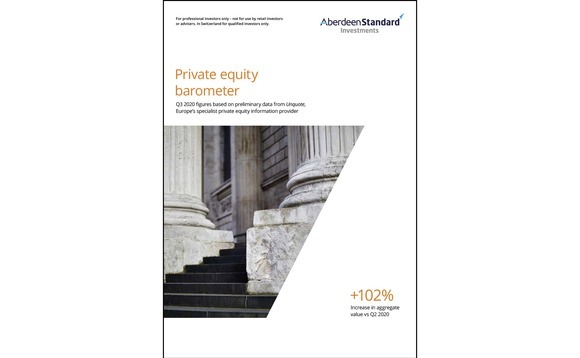
Q3 Barometer: Green shoots emerge

Buyout activity rebounded in the third quarter as lockdown restrictions eased across Europe, according to the latest Unquote Private Equity Barometer, produced in association with Aberdeen Standard Investments.
Click here to download the full Q3 Private Equity Barometer
Buyout levels were almost back to first-quarter figures, signalling a return to the pre-lockdown normal. The market recorded an aggregate value of €40.6bn, which was a considerable jump from the €18.3bn seen in Q2 (across 153 deals) confirming market sentiment that Q2 was a Covid-19 anomaly.
"Completing 785 new deals in excess of £54bn in value would have been viewed as highly improbable around the early stages of the lockdown in March/April, but private equity managers have adapted remarkably well to a 'new normal'," says Merrick McKay, head of European private equity at Aberdeen Standard Investments.
"We weren't surprised at the recovery in private equity deal value in Q3. Managers had been reporting a significant amount of new investment activity from early summer onwards and deal volumes have shown remarkable resilience throughout the crisis – it has been the large-cap space that saw the most dramatic dip, then rebound, in activity during the pandemic."
The aggregate value of deals in Q3 – buyout, growth capital and early stage – was up 102% versus the second quarter of 2020, mainly due to larger deal sizes, according to the Barometer.
The value of deals doubled to €54.1bn in Q3 from €26.7bn and the average deal value in the third quarter was €69m, up from €34.1m in Q2. This was spread across 785 deals, which was in line with the 786 recorded in the previous quarter.
"The reopening and renewed appetite of debt markets for PE, which is crucial for getting larger deals done, has undoubtedly aided the increase in average ticket sizes in Q3," says McKay.
"We've seen more new deal activity than exits, though. GPs are extremely sophisticated owners of business, and will tend to sell when the exit environment suits them – while this hasn't been as bad as we feared, no-one would suggest that now is the best time to be selling businesses in many sectors. As such, we are expecting a general lengthening in holding periods for many portfolios," adds McKay.
DACH, southern Europe stand out
European activity varied across regions: UK deal levels were lacklustre while the DACH region clocked the highest number of buyout deals overall and southern Europe experienced a noticeable rebound.
"UK buyout deal activity levels have remained suppressed, mostly due to the double-whammy of Covid-19 and significant near-term Brexit uncertainty. It certainly looks like Germany has had a good crisis in comparison with many European countries, and therefore no surprise that its new deal activity has held up well," says McKay.
Although the road ahead is still unknown, market commentators have taken comfort in private equity's ability to adapt and rebound during the pandemic, with high hopes for a strong fourth quarter.
"GPs have found they can transact in very different circumstances, and positive news on vaccine development will only lead to increased optimism when looking at new opportunities. We shouldn't forget that there's a lot of dry powder to deploy. The impact of longer-term economic damage needing repair is more difficult for all of us to assess."
Overall value up for early-stage deals
Growth capital deals suffered a hit in volume terms in Q3 with only 388 deals done, down 13.4% from Q2, largely due to subdued activity in France. But the total amount transacted came to €12.1bn, which was the highest figure since Q2 last year.
"We think the pandemic has accelerated trends that were already evident beforehand. This lends itself to increased opportunity to invest in business models either immune to, or potentially benefiting from, the impact of Covid-19. As such, it's no surprise that the growth capital space has remained buoyant throughout the crisis, with increasing appetite from institutional investors," McKay says.
Early-stage deal activity dropped from the previous quarter's peak volume of 183 deals to 158 in Q3, but aggregate value also remained robust. Says McKay: "While Q3 was down for new deal activity in the early-stage market, it's still on an upward trend in volume and value. Technology and healthcare, generally the major components of this market, have tended to benefit from being relatively immune to the pandemic and its potential aftermath."
Latest News
Stonehage Fleming raises USD 130m for largest fund to date, eyes 2024 programme
Sponsor acquired the public software group in July 2017 via the same-year vintage Partners Group Global Value 2017
Stonehage Fleming raises USD 130m for largest fund to date, eyes 2024 programme
Czech Republic-headquartered family office is targeting DACH and CEE region deals
Stonehage Fleming raises USD 130m for largest fund to date, eyes 2024 programme
Ex-Rocket Internet leader Bettina Curtze joins Swiss VC firm as partner and CFO
Stonehage Fleming raises USD 130m for largest fund to date, eyes 2024 programme
Estonia-registered VC could bolster LP base with fresh capital from funds-of-funds or pension funds









